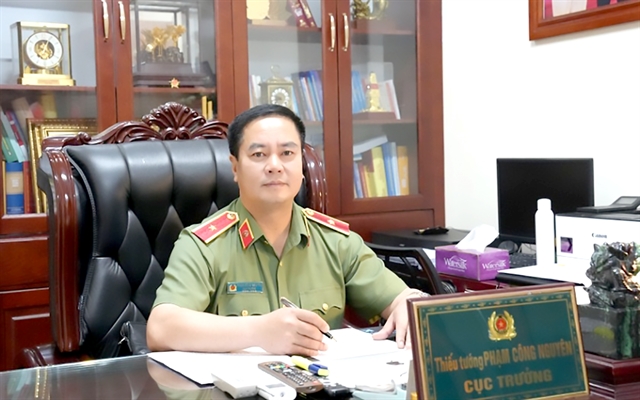.jfif) Opinion
Opinion

 |
| Major General Phạm Công Nguyên. Photo chinhphu.vn |
Major General Phạm Công Nguyên, director of the Department of Legal Affairs and Administrative and Judiciary Reform under the Ministry of Public Security, talks to Chính phủ (The Government) online newspaper about the preparation and implementation of the Law on Forces Participating in the Protection of Security and Order at grassroots level
Could you please elaborate on the significance and importance of issuing the Law on Forces Participating in the Protection of Security and Order at grassroots level?
The law was passed at the sixth session of the 15th National Assembly and will officially enforce from July 1, 2024. The enactment of the law meets the practical requirements for ensuring security and order at the grassroots level as identified in the Party's documents. It specifically elaborates on the provisions of the 2013 Constitution regarding the assurance of human rights and citizen rights, while also streamlining and enhancing the functions and tasks, creating a solid legal basis for the comprehensive establishment and maintenance of forces participating in the protection of security and order at the grassroots level.
Under current circumstances, the deployment and utilisation of the forces participating in the protection of security and order at grassroots level will bring about positive and effective impacts on State management of security and order. Moreover, given the extensive geographical areas and large populations in many commune-level administrative units, it is necessary to deploy the forces participating in the protection of security and order at the grassroots level to support the local police in fulfilling their duties. The approach enables comprehensive coverage and close monitoring of grassroots areas, facilitating proactive and timely implementation of resolutions to the relevant incidents and issues.
After the restructuring and consolidation, what is the total number of personnel in the forces participating in the protection of security and order nationwide and what are the specific tasks of the forces?
Following the restructuring and consolidation, the protection forces and specialised commune-level police forces currently in use, along with the positions of team leaders, deputy team leaders, comprise approximately 300,000 personnel.
Based on the review and assessment of the current activities of community forces participating in the protection of security and order at the grassroots level, the law stipulates their tasks after restructuring to ensure alignment with their capabilities and clearly define their role as supporters of commune-level police forces in the protection of security and order activities.
These tasks, which do not duplicate the responsibilities of the commune-level police and local authorities, are categorised into six groups: supporting in gathering information on security and order; supporting in fostering a nationwide movement for safeguarding the homeland's security; supporting in fire prevention, firefighting, search and rescue operations; supporting in administrative management regarding social order; supporting in mobilising and educating individuals who have committed legal violations residing at the grassroots level; supporting in patrolling to ensure security, order, and traffic safety.
What are the requirements for citizens?
The law specifies the criteria for selecting individuals to participate. In terms of age requirement, selected individuals must be from 18 to 70 years old. People above 70 years old, if in good health, may be considered by the commune-level People's Committee upon the request of the local police.
The selected individuals must have clear personal background with good moral character; adherence to the Party's guidelines, State policies and laws; not being subject to criminal prosecution or serving criminal sentences at the commune level; not being subject to legal or administrative penalties.
For educational qualifications, individuals must possess a school diploma or have completed basic secondary education. In border areas, islands, mountainous regions, economically and socially-disadvantaged areas, and areas inhabited by ethnic minorities, individuals who have completed primary education may also be recruited.
In terms of residency, selected individuals must have been residing or temporarily residing in the locality for at least one year and regularly living in the area where they apply to join the forces participating in the protection of security and order at the grassroots level. In terms of health requirements, individuals must be in good health as certified by a designated medical facility operating in accordance with the law.
What decrees and regulations have been drafted by the department so far to serve implementation?
The Ministry of Public Security has led the drafting of a decree detailing some provisions of the Law on Forces Participating in the Protection of Security and Order at the grassroots level, consisting of three chapters and eight articles, concerning uniforms, insignia, badges, certificates, equipment and tools for the forces participating in the protection of security and order at the grassroots level.
It also regulates provisions on conditions, entitlements, procedures and the responsible agencies for ensuring funding to provide benefits for individuals participating in the protection of security and order at the grassroots level, who have not yet enrolled in health or social insurance but suffer illness, accidents, injuries, or fatalities while performing their duties.
The law tasks the Minister of Public Security to give the detailed implementation of organisational activities, ensuring conditions for operations, conducting commendations and rewards for the forces participating in the protection of security and order at the grassroots level.
The draft decree also covers dossier preparation, selection procedures for members of the protection teams, procedures for establishing and recognising the protection teams, procedures for adjusting the number of members and teams.
Currently, the department has compiled draft decrees and regulations in accordance with the legal process, incorporating feedback from relevant ministries, sectors and localities. It is submitting to the competent authorities for the issuance of these documents at the same time as the Law on Forces Participating in the Protection of Security and Order at the grassroots level comes into effect. — VNS